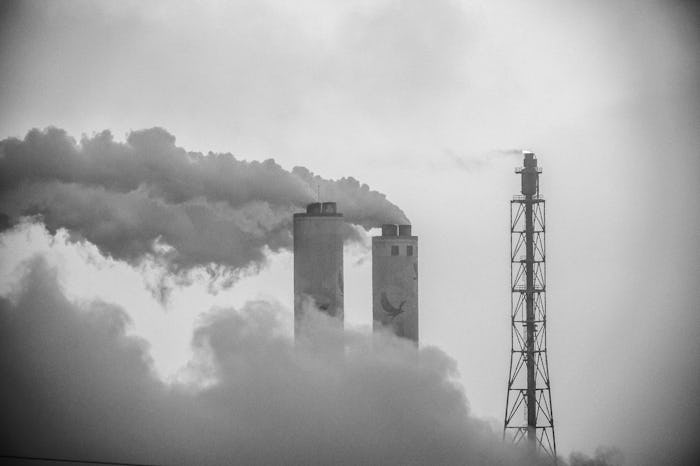News

How To Explain Climate Change To Your Kids, Because It's Become A Parenting Necessity
As the earth continues to warm and the polar ice caps continue to melt, the question of how to explain climate change to your kids has become a real parenting issue. On the one hand, being real about climate change is an important aspect of raising a responsible, knowledgable citizen of the world. On the other hand, though, no parent wants to scare their child with doomsday scenarios.
It's important that information about climate change comes from you, the parent, because—much as with that other big talk—if they don't hear it from you, you can only guess what they'll hear in the schoolyard. Yes, your precious child will likely attend school with children who have been told by their parents that climate change isn't real. After all, according to recent numbers from a University of Michigan study, 16 percent of Americans don't believe in climate change. (This is actually an all-time low, though, so the good news is that more and more Americans are taking climate change seriously.)
Given that severe drought, severe weather, and other climate change-related calamities have claimed millions of lives all over the world, climate change has become one of the most important global issues to discuss with children. As a parent, the topic might seem daunting. Here are some pointers for talking climate change with the kids.
Be Positive, But Realistic
On the surface, the numbers look bleak: According to the National Aeronautics and Space Administration (NASA), each of the 10 warmest years on record have occurred during the past 12 years. The acidity of surface ocean waters has increased by thirty percent since the beginning of the Industrial Revolution, and glaciers are retreating "almost everywhere" worldwide.
Yikes. Those numbers are scary, but they probably won't mean much to your kids. Plus, the idea isn't to scare the kids, but rather to make them care about the issue, thereby prompting them to help with the solution. So, for example, if you're explaining that there are more wildfires because of increasing temperatures and drought, be sure that you're also explaining how firefighters are coming up with new, creative ways to deal with the fires, such as using massive tanker trucks to bring more water to the fires.
Make The Political Connection
In the United States, the issue of climate change has become a trenchantly political one. For complex reasons that relate to the Republican Party's historical opposition to federal regulations, contemporary candidates for office in the GOP tend to deny climate change, or at the very least deny that regulations will help solve it. This partly mirrors the opinions of the voters themselves, who are much more likely to believe that climate change is a hoax if they're Republican.
Even though it might be difficult to explain, it's important to explicitly make this political connection when talking about climate change with children. American children are growing up in the only country in the world where the major conservative party actively denies climate change. According to a 2015 article in New York Magazine, "Of all the major conservative parties in the democratic world, the Republican Party stands alone in its denial of the legitimacy of climate science."
It's important for children to understand that the political aspects of the climate change conversation are a special—and especially bizarre—aspect of American politics.
Focus On The Solution, Not The Problem
Parents don't need to present climate change as an amorphous, terrifying Boogeyman that will destroy the world. Rather, parents can focus on the myriad ways that society is working to fix the problems caused by climate change.
So rather than talking about fossil fuel emissions, parents can talk about the potentials of solar power. Instead of worrying their children about deforestation, parents can explain how planting trees can help make the air cleaner. And instead of talking about the devastation of extreme weather, parents can explain how engineers are working around the clock to build innovative solutions, such as levees and storage basins. These solution-oriented conversations can even provide kids with ideas for what they want to be when they grow up.
Focus On The Local Climate Situation
As the effects of climate change become all too real, cities all over the world are scrambling to come up with local solutions to a worldwide problem. According to a recent article in Scientific American, city administrators all over the country are suddenly interested in devising contingency and prevention plans for extreme weather.
This means that in thousands of cities, engineers working on projects that range from "planning power grids" to "water management systems" are becoming climate change experts. In other words, the issue of climate change is probably relevant to a community near you, so it would be useful to make the local connection when explaining climate change to children.
The University of Michigan climate change survey mentioned above found that the severe droughts and floods recently seen in the United States have had a "very large effect" on convincing more Americans that climate change is a real problem. Making local connections to worldwide problems make climate change easier for everyone to understand—adults and children alike.
On the other hand, it's also important to carefully explain the difference between local weather patterns and global climate change. If your child sees that it's been an especially cold winter, explain why this doesn't contradict global warming. The same University of Michigan study found that relying too much on "local weather observations" can be an impediment to understanding the worldwide reality of climate change.
All told, climate change might be a difficult topic to breach with kids, but for the sake of their future, it's something that must be done.